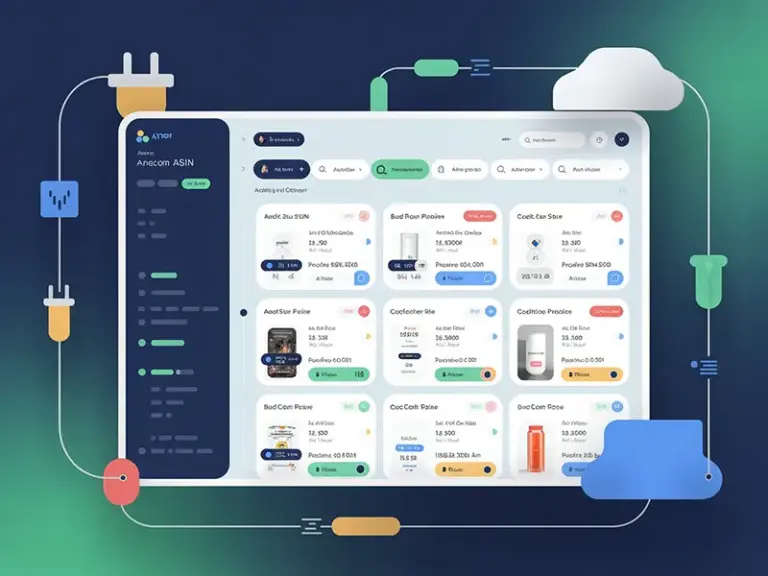In the fiercely competitive Amazon e-commerce ecosystem, accurate product data collection serves as the foundation for strategic decision-making. However, traditional Amazon ASIN data collection methods often face challenges including low efficiency, incomplete data coverage, and high technical barriers. Many sellers and data analysts encounter obstacles such as slow collection speeds, missing data fields, and anti-scraping mechanisms when attempting to batch extract ASIN product information, leading to missed market opportunities and competitive intelligence gaps.
Today, we will explore a comprehensive Amazon ASIN data collection solution, providing detailed insights into how Pangolin Scrape API enables efficient, stable batch product data extraction, helping you gain a competitive edge in data-driven e-commerce operations.
Core Challenges in Traditional ASIN Data Collection
The complexity of Amazon ASIN data collection far exceeds many people’s expectations. First is the issue of data field completeness. Amazon product detail pages contain dozens of critical data fields, from basic information like titles, prices, and inventory status, to deeper insights such as product descriptions, customer reviews, and variant information. Traditional collection methods often only capture surface-level information while failing to extract the deep data crucial for business decision-making.
Second is the technical bottleneck of scalable collection. When processing thousands of ASINs, ordinary scraping tools quickly encounter Amazon’s anti-scraping mechanisms, resulting in IP blocks, request rejections, and dramatically reduced collection efficiency. More seriously, unstable collection environments lead to data inconsistencies, affecting the quality of subsequent analysis and decision-making.
Timeliness also presents a critical pain point. Amazon product information changes frequently, with key metrics like prices, inventory, and rankings potentially experiencing significant fluctuations within short timeframes. Traditional manual or semi-automated collection methods cannot meet real-time monitoring requirements, often leading to incorrect business judgments based on outdated data.
Pangolin Scrape API: Revolutionary ASIN Data Collection Solution
Pangolin Scrape API has been specifically optimized to address the pain points of Amazon ASIN data collection, providing a comprehensive enterprise-grade solution. Our system supports millions of ASIN data collections daily, far exceeding the processing capabilities of traditional methods, ensuring that even large e-commerce enterprises can meet their data requirements.
In terms of data completeness, Pangolin API can extract all key fields from Amazon product detail pages, including basic product information, price variants, inventory status, sales rankings, customer review statistics, product descriptions, technical specifications, and image resources. Particularly noteworthy is our ability to collect deep data that many competitors cannot access, such as customer Q&A content, related product recommendations, and sales trend indicators.
From a technical architecture perspective, Pangolin employs distributed collection networks and intelligent anti-anti-scraping technology to ensure the stability and continuity of the collection process. Our system automatically handles various technical challenges, including dynamic content loading, JavaScript rendering, and CAPTCHA recognition, allowing users to focus on data analysis rather than technical implementation.
Batch ASIN Data Collection Implementation Guide
The first step in implementing batch ASIN data collection is clearly defining data requirements and collection objectives. Different business scenarios require different data fields – product selection might focus more on sales rankings and review data, while competitive analysis requires emphasis on price changes and inventory status. Clear requirements help optimize collection strategies and improve the targeting and efficiency of data acquisition.
Next is the preparation and management of ASIN lists. High-quality ASIN lists form the foundation of successful collection, which can be built through keyword searches, category traversal, competitive analysis, and other methods. Pangolin API supports multiple ASIN input methods, including batch uploads, API interface transfers, and scheduled task triggers, meeting collection needs of different scales and frequencies.
During the collection execution phase, Pangolin provides flexible configuration options. Users can set collection frequency, data fields, output formats, and other parameters according to business needs. Our system supports both synchronous and asynchronous collection modes – synchronous mode is suitable for small-batch real-time queries, while asynchronous mode is better suited for large-scale batch processing.
Code Example: Using Pangolin API for Batch ASIN Collection
import requests
import json
# Pangolin API configuration
api_key = "your_pangolin_api_key"
base_url = "https://api.pangolinfo.com/scrape"
# Batch ASIN list
asin_list = ["B08N5WRWNW", "B07XJ8C8F5", "B09G9FPHZ1"]
# Build request parameters
payload = {
"source": "amazon",
"country": "US",
"asins": asin_list,
"parse": True,
"format": "json"
}
headers = {
"Authorization": f"Bearer {api_key}",
"Content-Type": "application/json"
}
# Send batch collection request
response = requests.post(base_url, json=payload, headers=headers)
if response.status_code == 200:
data = response.json()
for item in data['results']:
print(f"ASIN: {item['asin']}")
print(f"Title: {item['title']}")
print(f"Price: {item['price']}")
print(f"Rating: {item['rating']}")
print("---")
else:
print(f"Request failed: {response.status_code}")
Data Quality Optimization and Best Practices
Ensuring Amazon ASIN data collection quality requires optimization across multiple dimensions. First is the selection of collection timing. Amazon’s data updates follow certain patterns, and choosing appropriate collection time windows can yield more accurate and timely data. Generally, weekday mornings and evenings in Eastern Time are periods of more frequent data updates.
Data validation and cleaning are also important aspects of ensuring quality. Pangolin API includes multi-layer data validation mechanisms that can automatically identify and filter anomalous data, but users still need to perform secondary validation based on business logic. We recommend establishing a data quality monitoring system to regularly check the reasonableness and consistency of key indicators.
For large-scale collection projects, we recommend adopting batch processing and incremental update strategies. Dividing large quantities of ASINs into small batches for processing not only improves success rates but also facilitates error troubleshooting and retries. Meanwhile, through incremental update mechanisms that only collect changed data, overall efficiency can be significantly improved.
Cost-Benefit Analysis and ROI Optimization
Compared to building in-house scraping teams or using traditional data services, Pangolin Scrape API offers significant advantages in cost-effectiveness. Building an in-house technical team requires not only substantial human resource investments but also continuous maintenance and upgrades to technical architecture to address Amazon’s constantly evolving anti-scraping strategies. Traditional data service providers are often expensive with limited data update frequencies, making it difficult to meet personalized requirements.
Pangolin’s pay-as-you-use model allows users to flexibly control costs based on actual usage, avoiding waste from fixed fees. More importantly, high-quality data can directly translate into business value through precise market analysis, competitive monitoring, price optimization, and other applications, often achieving return on investment in the short term.
Many clients report that after using Pangolin API, their product selection success rates improved by over 40%, and profit growth from pricing strategy optimization exceeded 25%. These actual business improvements far outweigh API usage costs, demonstrating the tremendous value of data-driven decision-making.
Future Development Trends and Technical Outlook
Amazon ASIN data collection technology is moving toward greater intelligence and automation. The application of artificial intelligence and machine learning technologies makes data collection not just simple information gathering, but enables intelligent analysis and prediction. Pangolin is developing AI-based data insight capabilities that can automatically identify market trends, predict price changes, and discover potential opportunities.
Real-time data stream processing is also an important future development direction. As e-commerce competition intensifies, requirements for data timeliness become increasingly demanding. Pangolin is building real-time data pipelines that can push information to users the moment product information changes, helping enterprises seize market opportunities.
Cross-platform data integration will become a new competitive advantage. Beyond Amazon, data integration and analysis from platforms like eBay, Shopify, and Walmart can provide more comprehensive market perspectives. Pangolin’s multi-platform data collection capabilities provide users with unified data interfaces and analysis frameworks.
Decision Guide for Choosing the Right Tools
When selecting Amazon ASIN data collection tools, multiple key factors need comprehensive consideration. Technical stability is the primary consideration – tools must be able to handle Amazon’s complex anti-scraping mechanisms and ensure long-term stable data acquisition. Data completeness and accuracy directly impact the reliability of analysis results, making it crucial to choose service providers that can offer comprehensive data fields.
Cost-effectiveness ratio is another important consideration. Beyond direct service fees, hidden costs such as technical maintenance, learning costs, and opportunity costs must also be considered. Pangolin’s one-stop solution maximizes total cost of ownership reduction, allowing users to focus on core business development.
Service support and technical response capabilities cannot be overlooked. Various technical issues may arise during data collection processes, and timely technical support can minimize business interruptions. Pangolin provides 24/7 technical support, ensuring users can receive professional assistance at any time.
Conclusion and Action Recommendations
Amazon ASIN data collection has evolved from simple information gathering to complex technical challenges and business opportunities. Successful batch collection requires professional technical solutions, comprehensive data processing workflows, and continuous optimization improvements. Pangolin Scrape API, through its advanced technical architecture, comprehensive data coverage, and flexible service models, provides ideal solutions for various enterprises.
For enterprises considering implementing ASIN data collection projects, we recommend starting with small-scale pilots and gradually expanding application scope. Verify data quality and business value through actual use before developing long-term data strategies. Additionally, attention should be paid to data security and compliance, ensuring collection activities meet relevant legal and regulatory requirements.
The era of data-driven e-commerce has arrived, and enterprises that can efficiently acquire and analyze data will gain competitive advantages. Choosing appropriate tools and partners and establishing comprehensive data collection and analysis systems is a strategic investment that every e-commerce enterprise should seriously consider.
Start Your ASIN Data Collection Journey Today
Don’t let technical barriers in data acquisition hinder your business development. Pangolin Scrape API provides professional, stable, and efficient Amazon ASIN data collection services.Try Pangolin API for Free


